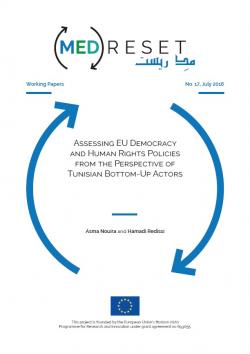Assessing EU Democracy and Human Rights Policies from the Perspective of Tunisian Bottom-Up Actors
This report is part of a series of working papers to provide an understanding and assessment of EU democracy and human rights policies from the perspective of local bottom-up actors in the Southern and Eastern Mediterranean countries as part of the MEDRESET project. The focus of this paper is on the grassroots political ideas and views for the future of the Tunisian transition, as well as regarding EU policies and their role in the field of democracy and human rights promotion, especially in the new “Arab Spring” context. Based on more than 30 interviews, the authors find that Tunisian stakeholders subscribe to universal political and civic ideas and support a role of the EU in the transition process, even though the EU is not perceived as having played a decisive role to date.
-
Details
Rome, IAI, July 2018, 21 p. -
In:
-
Issue
Working Paper 17
Introduction
1. Methodology
2. EU Policies Towards Tunisia
3. The Tunisian Constitutional Debate
4. Expectations for Tunisia
4.1 Citizenship
4.1.1 Perception of Citizenship
4.1.2 Links Between Citizenship and the Nation, the Arab Umma (Nation) and the Mediterranean Aspect
4.2 Democracy and Human Rights
4.3 Religious/Secular Cleavage
4.4 Gender Issues
5. Perceptions of the Mediterranean Space and the EU
5.1 Political and Socio-economic Models in the Mediterranean
5.2 Perception of the EU
Conclusions
References
Annex: List of Interviews



